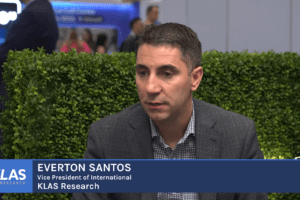I’m finding the task of providing ONC with feedback on their recently published Meaningful Use Interim Final Rule very difficult. It’s not that I have nothing to say (quite the contrary). The challenge is how to format my feelings about the rule in a way that it will be effective and useful.
The problem with much of what’s being done with meaningful use and the EMR stimulus is that they’ve made it far too complicated for a small doctors office. Considering small doctors offices make up a large part of the healthcare in the US, that means that the EMR stimulus will do little to stimulate these doctors to start using an EMR. I could certainly make drastic recommendations about how they could change the meaningful use definition to solve this problem. However, it would require drastic changes. The likes of which are not likely to see the light of day nor affect any actual change on what’s been and will be published when the rule is completely finalized.
I don’t think that being able to say “I told you so” after the fact is enough reason for me to propose drastic changes if they’re not going to be able to implement drastic changes to the legislation.
So, this leaves me with the option of trying to provide more specific and detailed feedback on what’s been proposed. Essentially suggesting small changes that could be done to improve specific details. These things might be considered and implemented, but considering the other major flaws will likely make a small difference in the actual regulation.
I’ll admit I’m a bit torn by this dilemma. As I write this, it seems like the best option is to combine the two options. Preface my feedback to the EMR stimulus with a caution related to the overall affect of the stimulus as it’s been designed. Then, follow up with specific commentary that will hopefully simplify and improve the rule for those who choose to try for the stimulus money.
For those who are interested in providing feedback, you can do so on Regulations.gov. Just do a search for “CMS-0033-P” and you’ll find it.














You are right. The rules clearly favor large multi specialty groups and disadvantage small groups and specialists. The real problem comes from the fact that while they won’t receive the stimulus money, the real hit is in 2015 when medicare revenues are cut by 5% due to lack of menaingful use. The govenment objective is to drive physicians into multispecialty group practice, I am not sure this is the best way to do that.
John… Could have sworn it was back in Mar 09 (can’t find the post now) that you made the point that docs needed to first make sure that their EHR made business and operational sense for their practice … and to consider stimulus incentives absolutely last.
Are we really surprised that with only $18bil available that the special interests inside the beltway made meaningful use more easily achieved by hospital EHR systems cared for by an internal IT staff … than the small PCPs?
Who would be working on behalf of the PCPs after MGMA?
Tom,
That’s an interesting analysis. I have to say that I don’t think they’re trying to drive people to multi specialty group practices. I just don’t think they’re that clever. The legislation was thrown together without much thought is my feeling.
However, you’re right that this move might be the result of the legislation. Although, I also wouldn’t be surprised if instead many just move away from taking Medicare. From reports I’ve seen, it’s barely worth taking anyway.
Don Berry,
I’ve been spouting that for months now like you said. In fact, I still believe that’s what practices should be doing. So, no it’s not that much of a surprise that it’s not going to work out well for solo doctors and small practices. However, I know that many of them are and were VERY interested in getting some of the stimulus money. I’m not sure what the next best step for me is in their regards. I like to think I do my best to be a doctor’s advocate.
John,
I know what you mean. For example, here’s a very recent message from a group I participate in:
“The Interim Final Rule contains the majority of base standards recommended by ‘xyz group’ (my parens).
Summaries – CCD
Problem Lists – SNOMED-CT
Medications – NCPDP Script 8.1, RxNorm
Allergies – UNII
Labs – HL7 2.5.1, LOINC, UCUM, SNOMED-CT Immunizations – HL7 2.3.1, CVX Biosurveillance – HL7 2.5.1 Public Health Reporting of Labs – HL7 2.5.1
The transmission standards – REST and SOAP, are consistent with the XDS.b, XDR, XCA and other transport modalities proposed by ‘xyz’ implementation guides. Not as specific as ‘xyz’ but consistent with its work and a good starting point.”
It’s really like medicine that tastes bad but is actually good for you. Not that hard to understand.
The small practice though is likely to choke on it or not take it at all.
— Jack
FULL DISCLOSURE
Silverlight 4 PM/EMR on the runway.
John … Ken Terry in his bNET Health Care blog this morning posted the following critique …
“Chorus of Critics Promise Changes in EHR Incentive Regs”
http://industry.bnet.com/healthcare/10001595/chorus-of-critics-promise-changes-in-ehr-incentive-regs/
There is a common thread in so many commentaries.
I remain of the opinion that unless EHR implementation and incentivization meets every specification MGMA outlines as what it’s membership will expect … then EHR implementation will fail.
That’s a great link Don B. Very interesting to read everyone’s take on it. My favorite one was the one that talked about far too many of the regulations are still unclear.
[…] Little Hope the Little Guy Will be Heard – I already provided my first lament about providing meaningful use feedback being difficult. However, I’ve started hearing a chorus of people around the internet expressing feedback […]